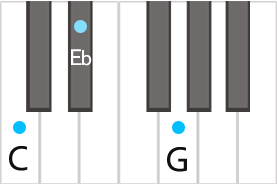Know Your Chords: The Minor Chord
Well, first off, for all you “tl;dr” freaks: the minor chord is that sound you’ve been hearing in your head for most of the last two months. Thank you and good night.
Now for the rest of you tingly little attention spans:
The minor chord, defined, is a triad consisting of the tonic note, a flattened third, and a perfect fifth. The third is the sole difference between the minor and major chord, but holy Xanax, what a difference it is.
The minor chord with its depressed third is the musical communicator of sadness and finality. It’s the code for giving up, admitting resolution, a fait accompli. Songs that are built around the minor chord (without any modifying notes—this is important but we’ll get to it a couple of entries from now) almost always represent the consummation of fears. Not the fear itself, but its realization. In minor key songs the pooch is more than screwed—he’s neutered, he’s done for, his bank account’s been emptied and his tumor’s the size of an eggplant. Put Forest Lawn on speed dial for that bitch.
I considered several examples of songs built around minor chords: funeral dirges, some Kurt Weill numbers, CNN bumper music. But for some reason, whenever I think of “songs built around minor chords,” without exception, this is the first one that pops into my head:
I realize everyone in this video is smiling; forget that for a second. “Early in the Morning” is built entirely around two minor chords: E minor and A minor. There’s not a single major chord in the song. Listen to the bluegrass-style guitar riff, one of the subtler such lines you’ll hear in a dance single. It’s a cascade of those two minor chords, highlighting that unhappy third across the whole phrase. Top it off with Charlie Wilson’s sad, certitude-driven decision: “I was young and foolish, I didn't know what I was doin’/I didn't know I lost you till you're gone… So I gotta get up early in the morning/To find me another lover.”
The minor key transforms what would otherwise be an uptempo R&B celebration into dejected resolution, albeit with an atypically assertive action plan to get up early in the morning to find a new lover. (Although I would think, and this is just based on historical data, he’d have a better chance if he sleeps until noon and finds another lover at night. Perhaps he believes a lover with a more standard working schedule would be more fidelitous, though I think they would be too preoccupied.)
Examples of minor-key songs that make you want to claw your eyes out include the morgue-tastic standard “St. James Infimary,” the crispy divorce lament “Don’t Smoke in Bed,” and Big Star’s chuck-it-all-in crypt-kicker “Holocaust.” From each of these songs’ sealed fates there is no deliverance, no hope of last-second redemption. Not only do you not pass Go, not only do you not get $200, but you also get your knees capped and must live off Park Place dumpsters.
Back in that major chord dissertation, I shoehorned a comic ending (a bit clumsily, but I was under pressure to ship) to illustrate that the irresponsible gladness of major chords could not always be trusted. This won’t happen in this discussion because minor chords almost always mean what they say. They represent established truths, some that are unpleasant, and others that simply temper a bull market. While you could manipulate a major chord (and vice versa) into meaning something devious and subversive, minor chords aren’t so psychologically malleable. Parody and Randy Newman notwithstanding, you don’t hear too many ironic songs in minor keys.
As off-brand as it feels to inject empiricism into this internet bag of feel-juice, I’m gonna have to bring up a research study to drive this stampede home. Of course it’s German.
Husband-and-wife team Daniela and Bernd Willimek developed something called die Strebetendenz-Theorie, or “The Theory of Musical Equilibration.” The study cites Swiss music theorist Gustav Güldenstein as describing the major chords as “corresponding to a feeling of a sober-minded contentment with the present moment.” Meaning everything’s fine, stop worrying, don’t rock the boat, coronavirus will go away like a miracle, end of press conference. But the study’s description of the message a minor chord offers truly surprised me—it wasn’t strictly “everything’s horrible,” but something else:
This statement surprised me for a couple of reasons. Number One, it more or less says I was right in those first few paragraphs. I’m not used to my anodyne musings being confirmed by German scientists. I’m pretty giddy about that. Someone tell The Atlantic I’m available.
Secondly, the “no more” message of the minor chord, vis-à-vis the “life’s great” connotation of the major, struck me as unusually poignant: It’s a protest. It’s a desire for an adverse condition to stop happening. When played slowly, it’s a lamentation that borders on self-immolation—“stop this pain.” When played quickly, it’s an enraged outburst—“stop this pain, or I’ll set this Park Place dumpster on fire.” But it all relates to the disruption of the satisfied stasis of the major chord which, I’ll remind you, I told you not to trust in the first place.
So in the interplay of music, minor chords are comedowns. When they’re the theme of a piece, life is a bitch. When they serve as transitions between major chords, they interpolate anxiety based on reason. When they’re used in Gilbert & Sullivan pieces, a naval officer is having a drunken nightmare.
The basic triad chords now covered, we’ll next discuss the smutty but profitable contrivances of seventh chords. I have lobster bibs on back order.

